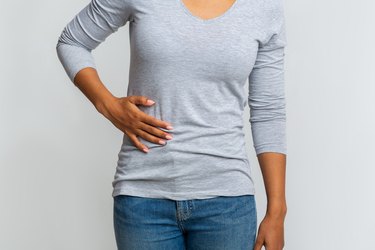
A gallbladder cleanse with grapefruit juice is rumored to help rid your body of gallstones, but there is no sound evidence that a diet or "cleanse" using any type of food or beverage, including grapefruit juice, will treat or prevent gallstones, according to the Mayo Clinic.
In order to "cleanse" your gallbladder, proponents of this practice may suggest ingesting a combination of olive oil, herbs and grapefruit juice (or some other type of fruit juice) over a specified time period. Some people believe that these ingredients can help break up gallstones and remove them from the gallbladder, enabling them to be excreted through stool, according to the Mayo Clinic.
Video of the Day
Video of the Day
But don't be fooled.
Read more: Just Say "No" to That Detox Diet or Juice Cleanse
Myths About a Gallbladder Cleanse
After partaking in a gallbladder cleanse using these ingredients, gallstone-looking formations may appear in one's stool, inspiring a mistaken belief that the cleanse was effective. However, these are not gallstones — they are probably just a combination of oil and other ingredients of the cleanse sticking together, revealing that this method of flushing gallstones is a myth, Mayo Clinic says.
Gallbladder cleanses are not necessarily safe. Potential risks depend on the specific ingredients used, but some people experience nausea, vomiting, diarrhea and abdominal pain during the cleanse, Mayo Clinic reports.
There are currently no cleanses, foods or beverages that are proven to treat or prevent gallstones, including grapefruit juice. "There is no scientific evidence to support the idea that grapefruit juice can prevent gallstones," says Whitney Linsenmeyer, PhD, RD, a spokesperson for the Academy of Nutrition and Dietetics and an assistant professor of nutrition at Saint Louis University in Missouri.
Gallstone Symptoms
People may have gallstones without experiencing symptoms. In the absence of symptoms, gallstones may not require treatment. Those who do experience symptoms will typically need to have their gallbladder surgically removed, according to the U.S. National Library of Medicine.
According to the Mayo Clinic, symptoms of gallstones that may necessitate medical treatment include:
- Sudden and rapidly intensifying pain in the upper right portion of your abdomen.
- Sudden and rapidly intensifying pain in the center of your abdomen, just below your breastbone.
- Back pain between your shoulder blades.
- Pain in your right shoulder.
- Nausea or vomiting.
Preventing Gallstones
While there are no at-home remedies to treat gallstones, there are a few lifestyle and diet changes that can potentially help prevent them.
Here are some tips for preventing gallstones from the National Institute of Diabetes and Digestive and Kidney Diseases (NIDDK):
- Eat more foods that are high in fiber, such as fruits, vegetables, beans, peas and whole grains.
- Eat fewer refined carbohydrates and less sugar.
- Eat healthy fats, like fish oil and olive oil, to help your gallbladder contract and empty on a regular basis.
- Avoid unhealthy fats, like those often found in desserts and fried foods.
You can decrease your risk of gallstones by eating a healthy, balanced diet, exercising regularly and maintaining a healthy weight. And, as Linsenmeyer says, you do not need to go to extreme measures to accomplish these goals. In fact, you should avoid highly restrictive, very low-calorie diets, as these may lead to rapid weight loss, which has been linked to an increased risk of gallstones, NIDDK points out.
Read more: Foods to Avoid When You Have Gallstones
- Mayo Clinic: “Gallbladder Cleanse: A 'Natural' Remedy for Gallstones?”
- Whitney Linsenmeyer, PhD, RD, LD, spokesperson, Academy of Nutrition and Dietetics; assistant professor, nutrition, Saint Louis University, St. Louis
- U.S. National Library of Medicine: “Gallstones”
- Mayo Clinic: “Gallstones”
- National Institute of Diabetes and Digestive and Kidney Diseases: “Eating, Diet, & Nutrition for Gallstones”
Is this an emergency? If you are experiencing serious medical symptoms, please see the National Library of Medicine’s list of signs you need emergency medical attention or call 911.